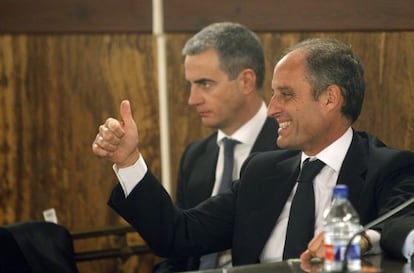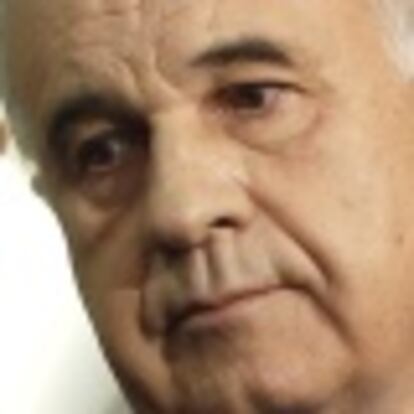All equal before the law? Not if you're a politician
Lawmakers, judges and policeman can have their cases heard in a wide range of courts While some say it is an unfair privilege, others argue it is disadvantageous

Let's imagine that you are driving down into Madrid along the main A6 road and you are breathalyzed by the police in a routine check. Your alcohol level exceeds the legal limit of 0.60 milligrams. You will now have to appear before a magistrate at a local court.
Now let's imagine that half an hour later, a minister, deputy, or senator is stopped at the same roadside check, and he or she also registers the same alcohol level.
He or she will have committed exactly the same offense as you, but they will not appear before some lowly local magistrate. Their case will be heard by the highest court in the land, the Supreme Court. This is known in Spain as aforamiento, whereby many senior holders of public office, notably politicians, enjoy special privileges and rights before the law - privileges and rights that their counterparts in the EU and the United States are not entitled to.
In Germany, for example, the former federal president, the head of state, Christian Wulff, had to resign in 2012 after a Hannover court ordered his immunity rescinded for having received bribes while he was the first minister of Lower Saxony. Had the German Constitutional Court had to step in to revoke his immunity, it would not have been the Supreme Court that heard his case, as in Spain, but the relevant court in the place where the offense allegedly took place: Hannover. In the event, he stepped down, and is now being investigated.
These are rights that their counterparts in the EU and US do not have
In Italy, former Prime Minister Silvio Berlusconi has just been sentenced to seven years in jail for paying for sex with a minor. But unlike Spain, where the case would have been heard by the Supreme Court, the trial was held in Milan, where the alleged offenses took place.
The same procedure is followed in the United States, where the president or other holders of high office are liable to impeachment if they commit a crime.
If the president resigns, or is removed from office, the offense will then be judged by a court in the place where it took place, and not by the Supreme Court.
But this is not the case in Spain, where there are several high-level investigations into corruption, among them the G¨¹rtel case, which is looking into the alleged illegal financing of the Popular Party, and Operation Campe¨®n, in which a former Socialist Party government minister, Jos¨¦ Blanco, is accused of influence peddling. The scandals have highlighted the privileges enjoyed by Spain's politicians - privileges that set them apart from the rest of the population. In other words, everybody is equal before the law, but some are more equal than others.
One lawyer thinks the privileges in fact put politicians at a disadvantage
That said, Gonzalo Mart¨ªnez-Fresneda, a Spanish lawyer who has defended several senior politicians and officials, among them Jos¨¦ Blanco and Baltasar Garz¨®n - the judge who was barred from office after being found guilty of overstepping his authority - believes that the privileges aforados enjoy put them at a disadvantage before the law.
"These privileges entail more inconveniences than advantages," he says. "The only advantage of being tried by the Supreme Court is the quality of the magistrates, which is higher than most of their colleagues in other courts, and, therefore, offers an a priori guarantee. But unlike the rest of us, aforados are unable to appeal against a sentence, or have it reviewed by another court, a fundamental right within the European Union."
Another problem aforados face, says Mart¨ªnez-Fresneda, is that the judge and the lawyers involved in the investigation all belong to the same court. "It is hard for the court to maintain the necessary distance in the event that appeals need to be made against the judge overseeing the case: it would be seen as overruling a colleague," he says.
But Juan Luis G¨®mez Colomer, professor of procedural law at the Jaume I de Castell¨®n University, says the advantages of being tried by the Supreme Court far outweigh the disadvantages. "These people may not have the right to appeal, like the rest of us, but most of us would much prefer to be tried by the highest court in the land." He believes the Supreme Court's job is to deal with appeals, and to establish legal precedents. "That is what it is supposed to do, not try cases," he says.
"It's often the case that the judge overseeing the hearing of an aforado has not actually investigated a criminal case for three decades, or ever - these judges have often never worked in the day-to-day of managing an investigation, and in such cases, the most likely outcome of the hearing will be liberty for the accused."
I?aki Esparza, a professor at the University of the Basque Country, has written the definitive study on aforamiento. He says that expecting a Supreme Court judge to oversee an investigation is like "expecting the best brain surgeon in the land to become a GP and take care of people with colds."
Esparza argues that far from enjoying privileges denied to the rest of society, the justice meted out to aforados is "of poor quality." He points to the Berlusconi trial. "If he had been tried in Spain, he would have reason to be worried, because he couldn't appeal. He would go to jail. If I were an aforado facing trial, I would look for a good lawyer to take my case to the European Court of Human Rights (ECHR), as this would be the only way to appeal against my sentence." The ECHR has already criticized Spain on several occasions for its lack of an appeals system.
Privilege or otherwise, the experts agree that there are too many aforados in Spain. Aside from those specifically mentioned in the Constitution - the prime minister, government ministers, deputies and senators - a host of other officials are protected by aforamiento, including judges, prosecutors, magistrates sitting on the Constitutional Court and the Audit Office, members of the General Council of the Judiciary (the body that oversees the Spanish legal system), members of the Council of State, the Ombudsman, as well as all their equivalents at regional level.
To this already lengthy list can be added more than 200,000 Civil Guards, national, regional and local police, to whom aforamiento is applied in the case of provincial courts. In ball park terms, it all adds up to around 215,000 aforados in Spain.
The trials of aforados create dysfunctional situations within the legal system. For example, in cases involving aforados and non-aforados, and where the sentence handed down to the former contradicts that of the latter, the case will end up being heard in a special court, which, in the case of the Supreme Court, gives the non-aforado no right of appeal.
Aforamiento also makes it hard to handle corruption cases, because the judge overseeing the case has to divide it up, sending the accused to their respective courts, with the risk that they will be let off. If an aforado doesn't like the judge overseeing his or her case, all they have to do is resign. Which is why Esparza suggests an overhaul of the different categories of aforados.
V¨ªctor Moreno Catena, a professor of procedural law at the Carlos III University, says: "The only ones we need to keep are those outlined in the Constitution: government, deputies and senators, and limit the rest to the exercise of their duties."
On June 12, Rosa D¨ªez, a deputy for the centrist UPyD party, called on Justice Minister Alberto Ruiz-Gallard¨®n to reduce the number of aforados, saying they were "privileged."
Speaking in Congress, Gallard¨®n said that far from being privileged, aforados had "fewer rights," and no right of appeal. Which rather begs the question: if it is so disadvantageous, why doesn't the government want to do away with aforamiento?

Baltasar Garz¨®n
The judge who uncovered the G¨¹rtel corruption case was barred from office after being found guilty of ordering an illegal wiretap of suspects talking to their lawyers in jail. He claims that his aforado status worked against him.

Oriol Pujol
The Catalan Convergence Party's number two is suspected of involvement in a scheme to rig the awarding of public contracts within the ITV vehicle-licensing system. His case is being investigated by the regional high court.

Rafael Blasco
He was suspended from the PP and expelled from his regional parliamentary group, but he has kept his seat, meaning the Valencia High Court will oversee the investigation into his involvement in siphoning off development funds.

Francisco de Urqu¨ªa
The trial of this former judge, accused of receiving bribes in the Malaya case, was heard by the Supreme Court of Andalusia. He has also been accused of receiving bribes in another regional corruption case.

Luis B¨¢rcenas
Judge Baltasar Garz¨®n was inhibited by the Supreme Court after finding the initials LB in evidence relating to the G¨¹rtel corruption case. Once B¨¢rcenas ceased to be a senator, his case was passed to the Madrid High Court.

Yolanda Barcina
Barcina, head of the regional government of Navarra, is accused of fiddling her expenses. She is now awaiting a judicial decision on whether her case will be referred to the Supreme Court.

Sonia Castedo
The Popular Party mayor of Alicante has been cited in the Brugal case, in which she is accused of abusing her position to help businessman Enrique Ortiz. She refuses to resign as a member of the Valencia regional assembly.

Jos¨¦ Blanco
The former Socialist Party minister has been called to testify in the Operation Campe¨®n influence-peddling investigation. He is accused of using his position to help a business obtain a permit to build a warehouse.
Tu suscripci¨®n se est¨¢ usando en otro dispositivo
?Quieres a?adir otro usuario a tu suscripci¨®n?
Si contin¨²as leyendo en este dispositivo, no se podr¨¢ leer en el otro.
FlechaTu suscripci¨®n se est¨¢ usando en otro dispositivo y solo puedes acceder a EL PA?S desde un dispositivo a la vez.
Si quieres compartir tu cuenta, cambia tu suscripci¨®n a la modalidad Premium, as¨ª podr¨¢s a?adir otro usuario. Cada uno acceder¨¢ con su propia cuenta de email, lo que os permitir¨¢ personalizar vuestra experiencia en EL PA?S.
En el caso de no saber qui¨¦n est¨¢ usando tu cuenta, te recomendamos cambiar tu contrase?a aqu¨ª.
Si decides continuar compartiendo tu cuenta, este mensaje se mostrar¨¢ en tu dispositivo y en el de la otra persona que est¨¢ usando tu cuenta de forma indefinida, afectando a tu experiencia de lectura. Puedes consultar aqu¨ª los t¨¦rminos y condiciones de la suscripci¨®n digital.








































